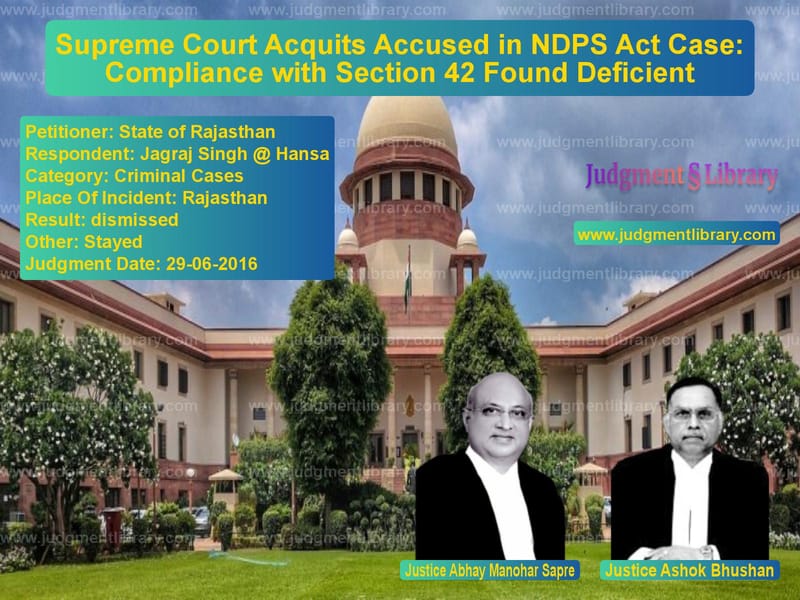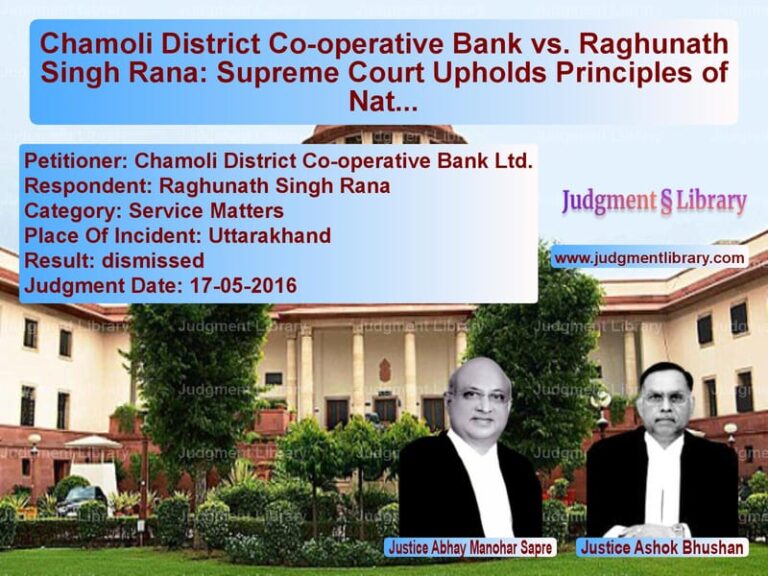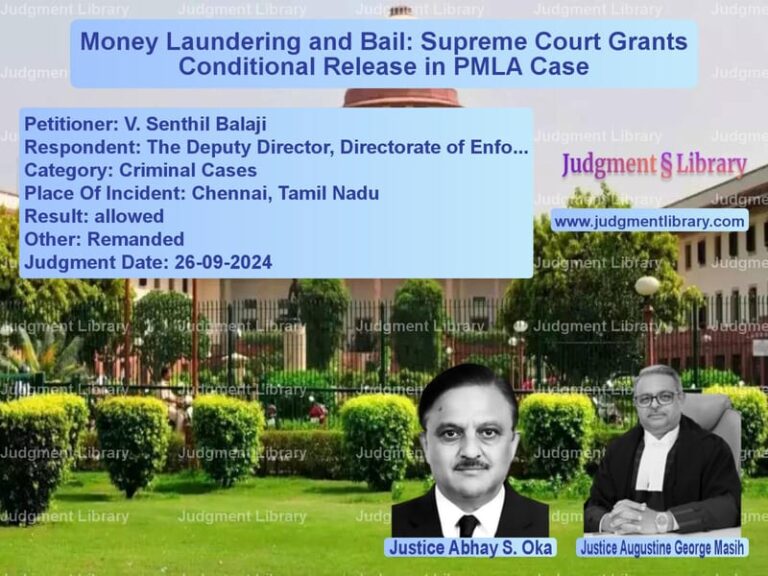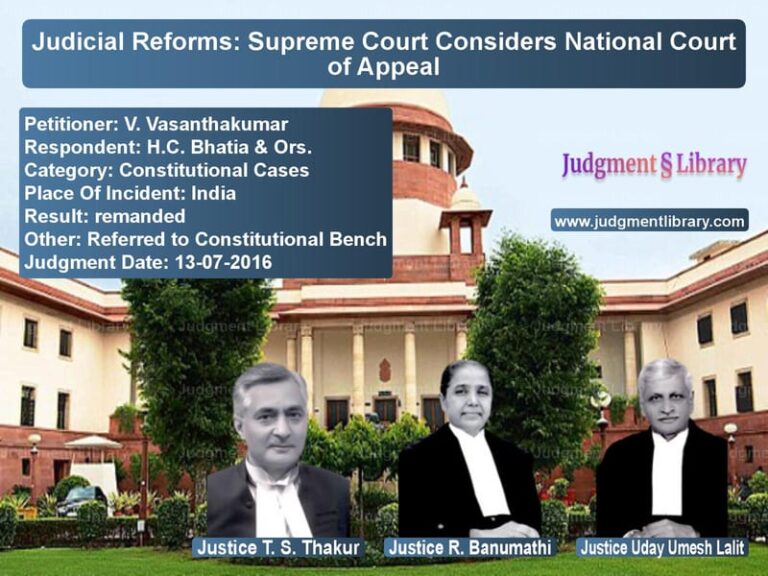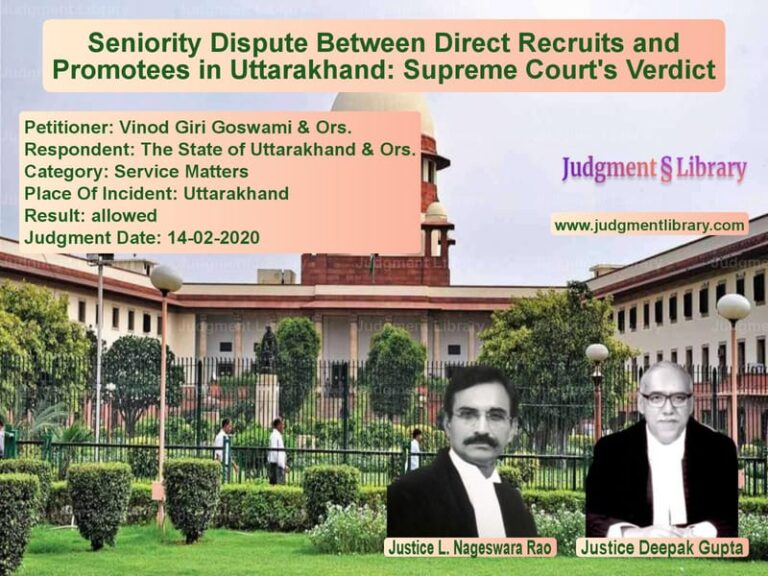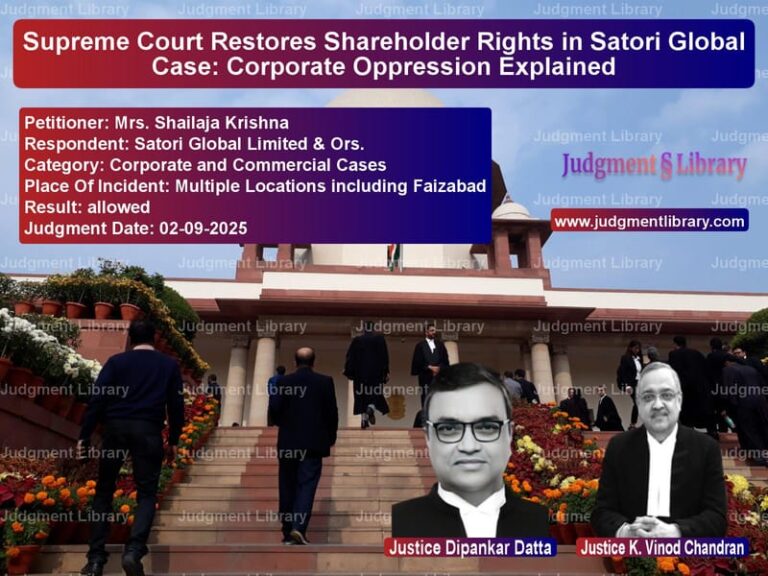Supreme Court Acquits Accused in NDPS Act Case: Compliance with Section 42 Found Deficient
The Supreme Court of India, in the case of State of Rajasthan v. Jagraj Singh @ Hansa, addressed an appeal filed by the State of Rajasthan challenging the acquittal of the accused under the Narcotic Drugs and Psychotropic Substances Act, 1985 (NDPS Act). The appeal was dismissed, upholding the High Court’s decision, which set aside the conviction due to non-compliance with mandatory provisions of the Act.
Background of the Case
The prosecution alleged that on August 9, 1998, the police received secret information regarding the transportation of narcotic substances in a blue jeep (HR 24-4057). Acting on the tip-off, the police intercepted the vehicle at 10:15 PM and found nine bags of opium powder. The accused, Jagraj Singh and Kishan Lal, were arrested, and an FIR was registered against them under Section 8/15 of the NDPS Act.
The trial court convicted both accused and sentenced them to 12 years of rigorous imprisonment along with a fine of Rs. 1,20,000 each. However, the Rajasthan High Court overturned the conviction, leading the State to file an appeal before the Supreme Court.
Arguments by the Appellant (State of Rajasthan)
- The police complied with the requirements of Sections 42(1) and 42(2) of the NDPS Act by recording the information and sending it to the senior officer.
- The intercepted vehicle was a public transport vehicle, and therefore, compliance with Section 42 was not necessary under Section 43 of the NDPS Act.
- The chain of evidence remained unbroken, and prosecution witnesses confirmed the recovery of the narcotic substance.
Arguments by the Respondent (Accused Jagraj Singh)
- The police failed to comply with the mandatory provisions of Sections 42(1) and 42(2), as the information sent to the senior officer did not match the recorded version.
- The vehicle in question was a private vehicle, and therefore, compliance with Section 42 was mandatory.
- The independent witnesses turned hostile, raising doubts about the prosecution’s case.
- The sample seals were not properly maintained, casting doubt on the integrity of the seized contraband.
Supreme Court’s Observations
1. Non-Compliance with Section 42(1) and Section 42(2)
The Supreme Court observed that there was a discrepancy between the recorded secret information and the report sent to the senior officer. The Court ruled:
“The requirement of Section 42(2) mandates that information must be reduced in writing and a copy sent to the senior officer. Any deviation from this procedure affects the credibility of the prosecution case.”
2. Applicability of Section 43: Public Transport or Private Vehicle?
The prosecution argued that the vehicle was a public transport vehicle, making compliance with Section 42 unnecessary. However, the Supreme Court found that there was no evidence proving that the jeep was a public transport vehicle.
“The vehicle in question had no permit to operate as a public transport vehicle. Thus, it cannot be considered a ‘public conveyance’ under Section 43.”
3. Deficiencies in Seizure and Handling of Evidence
The Court also found that the sealing of the contraband was not properly documented, and the chain of custody was not well-maintained. This raised concerns about possible tampering.
“The prosecution must ensure that the material evidence remains untampered. Failure to properly maintain sample seals raises serious doubts.”
4. Independent Witnesses Turning Hostile
Two independent witnesses turned hostile, refusing to support the prosecution’s version of the recovery. The Court noted that when independent witnesses do not corroborate the prosecution’s claims, the benefit of the doubt must go to the accused.
Supreme Court’s Final Decision
- The appeal was dismissed, and the High Court’s acquittal was upheld.
- The Supreme Court reaffirmed that non-compliance with mandatory provisions of the NDPS Act vitiates the conviction.
- The accused was ordered to be released immediately if not required in any other case.
Implications of the Judgment
1. Reinforcement of Safeguards Under NDPS Act
The ruling underscores the importance of procedural compliance in NDPS cases, ensuring that accused individuals are not convicted without proper adherence to legal safeguards.
2. Clarification on Section 43: Definition of Public Place
The Supreme Court’s interpretation of ‘public conveyance’ clarifies that private vehicles cannot be treated as public transport, thereby requiring strict adherence to Section 42.
3. Importance of Independent Witnesses
The ruling highlights that when independent witnesses turn hostile, courts must scrutinize the case more rigorously before upholding convictions.
Conclusion
The Supreme Court’s decision in State of Rajasthan v. Jagraj Singh @ Hansa sets a precedent for ensuring compliance with the NDPS Act while protecting individuals from wrongful conviction. By upholding the High Court’s decision, the Court reaffirmed that procedural lapses cannot be overlooked in cases involving serious criminal charges.
Don’t miss out on the full details! Download the complete judgment in PDF format below and gain valuable insights instantly!
Download Judgment: State of Rajasthan vs Jagraj Singh @ Hansa Supreme Court of India Judgment Dated 29-06-2016-1741872342123.pdf
Direct Downlaod Judgment: Direct downlaod this Judgment
See all petitions in Custodial Deaths and Police Misconduct
See all petitions in Judgment by Abhay Manohar Sapre
See all petitions in Judgment by Ashok Bhushan
See all petitions in dismissed
See all petitions in Stayed
See all petitions in supreme court of India judgments June 2016
See all petitions in 2016 judgments
See all posts in Criminal Cases Category
See all allowed petitions in Criminal Cases Category
See all Dismissed petitions in Criminal Cases Category
See all partially allowed petitions in Criminal Cases Category

